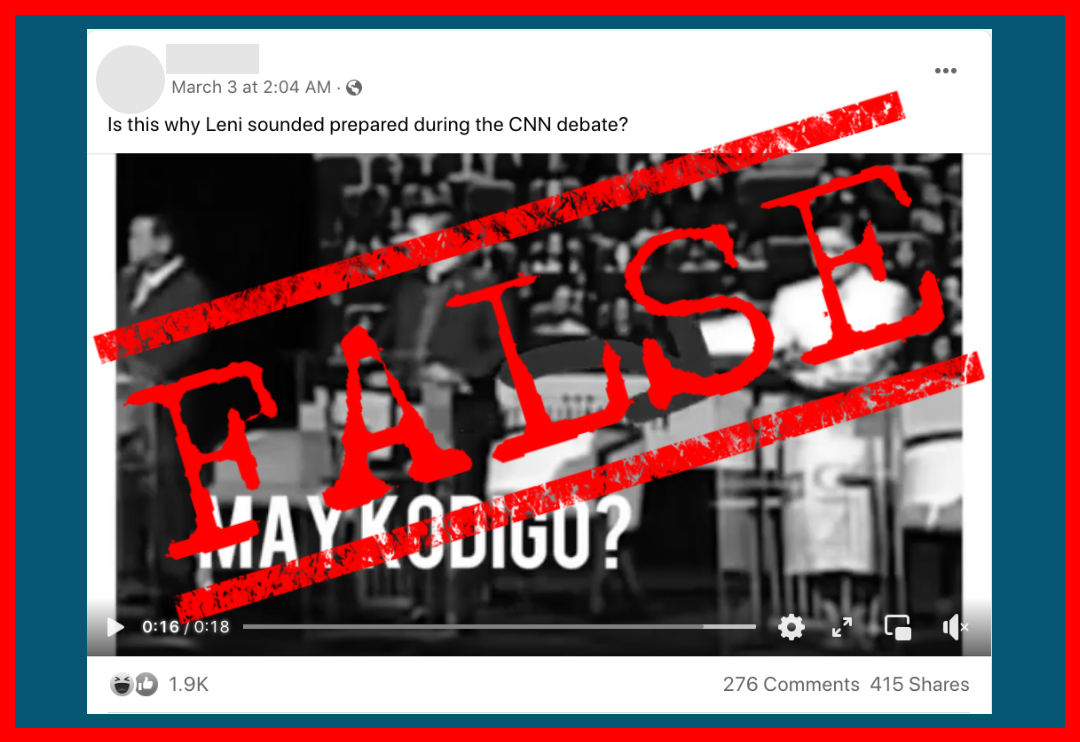This was related to us by more than one source.
It was an editorial guidance said to have come from ”top management.” It was conveyed by way of the news advisory Viber group of CNN Philippines’ newsroom. A top editor issued this directive: “Style Alert: Strongman is preferred over dictator in describing late former president Ferdinand Marcos to avoid throwing shade, more neutral.Strongman – one who leads or controls by force of will and character. Dictator – a person who rules a country with total authority and often in a cruel or brutal way. (Webster)”
CNN Philippines’ “top management” can refer to anyone among the major and minor investors behind Nine Media Corporation, the sole owner and operator of CNN Philippines.
In the beginning, the directive was met with stony silence.
The first to react was an anchorwoman known for her sharp questioning. She wrote: “Agreed on this. A more ‘objective’ way to describe the man who ruled the Philippines for 20 years – without revising history.”
A beat correspondent was the first to break the ice: “Question po, sir, does it mean we can use ‘dictator’ too? I think history has well established that Marcos is a dictator as fact. CNN International also identifies Marcos as dictator.”
The top editor replied: “As mentioned, to avoid putting color especially in an election season, and even if foreign media has branded him that way including CNNI has branded him that way, we would use STRONGMAN instead of DICTATOR.”
The agitation was just beginning.
When a copy editor challenged the directive, the top editor persisted: “Yup, foreign media has branded him for the longest time, including CNN International. But we’d rather downplay the hype especially during election season.Besides, the directive is from top management.”
Finally, another copy editor chimed in. “Good afternoon, I have no intention of quarreling with anyone over labels. I also express willingness to obey the wish of management on the use or not of certain labels. But I just want to point out that there is NO COLOR in calling a dictator a dictator.”
“Journalists call a spade a spade, walang paligoy-ligoy.If you were on EDSA in February 1986 you should have heard that the only word they – we the Filipinos – described the despot they were driving out of Malacañang: DICTATOR.I remember clearly what Filipinos were shouting then: ‘Marcos diktador tuta.’I don’t remember hearing ‘Strongman out!’ on EDSA. There is no color in not using dictator now just because the deposed, disgraced tyrant’s son now wants to occupy that same position of power that the dictator used to plunder the Philippine economy with that was second only to Japan when he first took the helm. By the end of the dictator’s 20-year rule, the Philippines was one of the poorest in Southeast Asia, unable to pay debts even while the dictator, his family and cronies squirreled away huge fortunes.BTW, CNN International was never soft on Donald Trump.”
By the end of the day, that post had generated over 40 likes from the newsroom. The agitation was full blown. People were sending private messages to each other. But there was also the fear of repercussions for speaking out.
One news producer passed a message: “Kakasabi lang po pala ni S. J. na final na raw yung guidance even with Sir P____’s rant. I hate this company.”
By this time, the various news anchors had joined the chorus. From one: “Sir, we didn’t change the terminology when referring to the late dictator or giving context when Bongbong Marcos or any member of the Marcos family ran for public office in previous elections. What has changed po?”
Another: “Sorry to push it. But to add to this, wouldn’t the other side question if we suddenly use STRONGMAN vs. DICTATOR. Wouldn’t they put color or ask why we’re going soft?”
The ultimate irony was put forth by another anchor: “What do we use instead of DIKTADOR in the Tagalog newscasts?”
One anchor was forceful. “If we are calling the irresponsible revisionist narrative that is being put out there, why can’t we call former President Marcos a dictator?That’s a fact.We’re not calling the candidate a dictator. This is not the time to go soft on our history.I think our job is primarily about accountability, then neutrality.”
Late in the day, a famous business anchor added his voice. “Here are the facts: Ferdinand Marcos Sr. seized dictatorial power in 1972, a year before his second term in office was due to expire. He placed the Philippines under martial law. He padlocked congress, ordered the arrest of political rivals and ruled by decree. His rule was characterized by widespread extrajudicial killings and the torture of opponents. Aren’t these facts sufficient to call him a DICTATOR vs STRONGMAN? And being a CNN brand, shouldn’t we also follow the style of CNN International which refers to him as a DICTATOR?”
The next morning, word had gotten around that the top source of the directive was the president of CNN Philippines.
Facing a possible mutiny from the newsroom, the directive was toned down: “Dear colleagues, Thank you all for your comments and insights on the use of the word ‘dictator’ and ‘strongman’ which are useful in clarifying our style guide. The CNN Philippines brand equates to accurate, fair, and balanced reporting, and we will vigorously pursue this in our election coverage. This means that our content and conversations with aspirants of elective positions in 2022 will show no prejudice to a particular personality or party.”
“This includes the use of the word ‘dictator’ for the late former president Ferdinand Marcos, in reference to his son and namesake, Ferdinand ‘Bongbong’ Jr.It is a matter of fact that the country was ruled under a dictatorship during the Marcos years for 20 years, marked by a number of abuses. The reparations law for human rights victims and ill-gotten wealth retrieved from the family, among others, are proof of that. In the same way, we will henceforth use matter of fact the word ‘dictator’ or ‘strongman’ in reference to the late president in all platforms, particularly in delivering it on air. For your guidance.”
But the message has been made clear: Historical revisionism is big business. Big business itself is part of the Marcos tentacles. Marcos is dead, but crony capitalism is alive and well.
The views in this column are those of the author and do not necessarily reflect the views of VERA Files.

